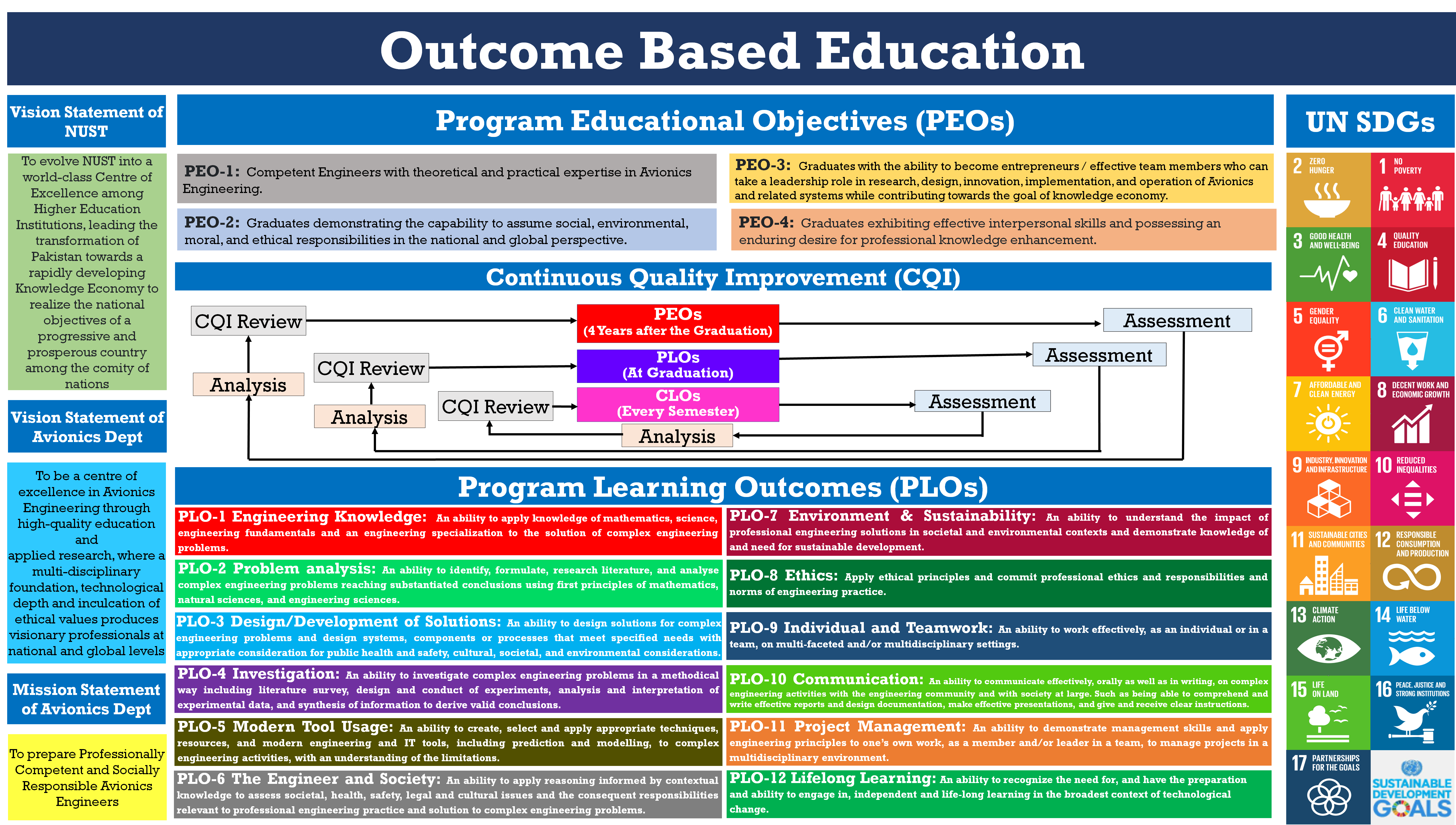PEOs & PLOs
Program Educational Objectives (PEOs) – BE (Avionics)
For BE (Avionics), four Program Educational Objectives (PEOs) have been defined, which are the attributes the program graduates are expected to possess 4 years after graduation. PEOs of BE Avionics Engineering program are to produce engineers who, after four years of graduation, become
PEO 1. Competent Engineers with theoretical and practical expertise in Avionics Engineering.
PEO 2. Graduates demonstrating the capability to assume social, environmental, moral, and ethical responsibilities in the national and global perspective.
PEO 3. Graduates with the ability to become entrepreneurs / effective team members who can take a leadership role in research, design, innovation, implementation, and operation of Avionics and related systems while contributing towards the goal of knowledge economy
PEO 4. Graduates exhibiting effective interpersonal skills and possessing an enduring desire for professional knowledge enhancement
Program Learning Objectives (PLOs) – BE (Avionics)
To prepare the students to achieve the Program Educational Objectives (PEOs), following Program Learning Outcomes (PLOs), that is, statements that describe what students are expected to know and are able to do by the time of graduation, have been defined:-
PLO 1 : Engineering Knowledge. An ability to apply knowledge of mathematics, science and engineering to the solution of complex engineering problems.
PLO 2 : Problem Analysis. An ability to identify, formulate, research literature, and analyze complex engineering problems reaching substantiated conclusions using first principles of mathematics, natural sciences and engineering sciences.
PLO 3 : Design/Development of Solutions. An ability to design solutions for complex engineering problems and design systems, components or processes that meet specified needs with appropriate consideration for public health and safety, cultural, societal, and environmental considerations.
PLO 4 : Investigation. An ability to investigate complex engineering problems in a methodical way including literature survey, design and conduct of experiments, analysis and interpretation of experimental data, and synthesis of information to derive valid conclusions.
PLO 5 : Modern Tool Usage. An ability to create, select and apply appropriate techniques, resources, and modern engineering and IT tools, including prediction and modelling, to complex engineering activities, with an understanding of the limitations.
PLO 6 : The Engineer and Society. An ability to apply reasoning informed by contextual knowledge to assess societal, health, safety, legal and cultural issues and the consequent responsibilities relevant to professional engineering practice and solution to complex engineering problems.
PLO 7 : Environment and Sustainability. An ability to understand the impact of professional engineering solutions in societal and environmental contexts and demonstrate knowledge of and need for sustainable development.
PLO 8 : Ethics. Apply ethical principles and commit professional ethics and responsibilities and norms of engineering practice.
PLO 9 : Individual and Team Work. An ability to work effectively, as an individual or in a team, on multi-faceted and/or multidisciplinary settings.
PLO 10 : Communication. An ability to communicate effectively, orally as well as in writing, on complex engineering activities with the engineering community and with society at large. Such as being able to comprehend and write effective reports and design documentation, make effective presentations and give and receive clear instructions.
PLO 11 : Project Management. An ability to demonstrate management skills and apply engineering principles to one’s own work, as a member and/or leader in a team, to manage projects in a multidisciplinary environment.
PLO 12 : Lifelong Learning. An ability to recognize importance of and pursue lifelong learning in the broader context of innovation and technological developments.


